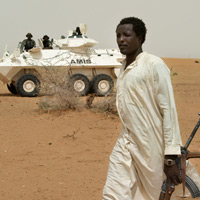
Current situation/Background
The brutal and deplorable September 29th attack on African Union peacekeepers by Darfur’s fracturing rebel groups, the escalating insecurity for humanitarian workers, and the roadblocks thrown up
by the Government of Sudan highlight the need to keep international attention and pressure on deploying the hybrid UN-AU peacekeeping force, or UNAMID. The UN Security Council authorized UNAMID on July 31, but the UN has had success in finding countries willing to contribute troops to the force, but has had difficulty obtaining the necessary logistical support and military equipment.
Key players/Debate/Important Questions
Government of Sudan—Khartoum is systematically impeding UNAMID’s deployment by throwing up roadblocks such as: impeding the construction of new AU bases by refusing to lease land and provide access to resources; denying the UN full use of Darfur airports and limiting night flight; refusing to permit the UN to upgrade runways so cargo planes can land; delaying approval of visas for UN personnel; and insisting that non-African forces are not needed in Darfur.
African Union—The African Union continues to equivocate over the deployment of non-African forces to Darfur and cooperation gaps between the AU and UN could impede full deployment of UNAMID.
UNAMID—The 26,000-strong force is to be the largest UN-led peacekeeping force ever deployed and will need to protect themselves and Darfur’s civilians from an array of armed groups spread across nearly 200,000 square miles of challenging terrain.
United States—The U.S. called for the hybrid force, yet it is not offering enough equipment and logistical support or pressing hard enough for others to contribute.
Policy Challenges
Serious obstacles threaten to derail the rapid deployment
of UNAMID:
- Roadblocks thrown up by the Government of Sudan
- Insufficient equipment and logistical support from the most important donors, such as the U.S.
- Disagreements between the AU and UN over the composition of the force and the unequal capacities of the two organizations
Policy Recs/Action Items for change
To prevent UNAMID from failing even before it deploys, the international community must:
- Employ a full-court diplomatic press with the Government of Sudan to secure land, water, and Khartoum’s full commitment to the speedy deployment of the force
- Provide the necessary equipment and logistical force to the African Union
- Use targeted pressures to overcome obstacles presented by the Government of Sudan
- Ensure that Secretary General Ban Ki Moon makes use of the monthly reporting to the Security Council on the progress of implementation
- Work behind the scenes to cement agreement from the AU on the participation of non-African forces and affirmation of the UN’s command and control role

